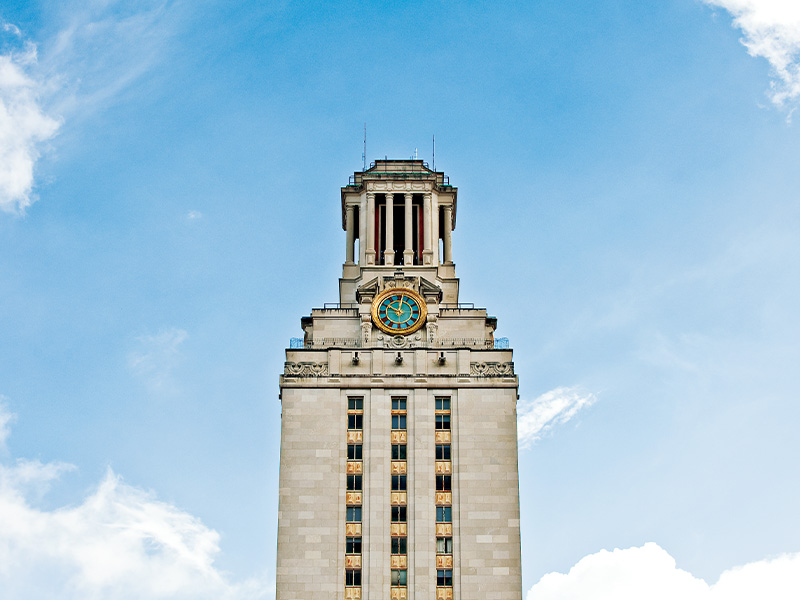Texas Venture Labs Bridges Engineering and Business

“Engineering students don’t have to be afraid of any part of business,” said Hyunji Lim, a graduate student in biomedical engineering at the Cockrell School of Engineering.
Lim is enrolled in Texas Venture Labs (TVL), a new initiative at The University of Texas at Austin focused on interdisciplinary education and research initiatives that support entrepreneurship, innovation, and company formation.
Students listen to entrepreneur Alan Blake during a Texas Venture Labs class.
“Entrepreneurship in BME is really important,” she said. “When I was an undergrad, I didn’t care too much about it, but now that I am in grad school, I want to see how far technologies that I make go. Research is valuable, but as an engineering student in the biomed area, I feel obligated to know this stuff.”
Rob Adams, director of Texas Venture Labs (TVL), describes the program as teaching students “applied entrepreneurship.”
“It’s one thing to learn all the theory, it’s another thing to apply it,” he said. “Students are learning the application of entrepreneurial techniques.”
Housed in the McCombs School of Business, the program was co-founded by the Cockrell School of Engineering. As a founding partner, the Cockrell School works directly with TVL to provide educational opportunities to engineering graduate students interested in entrepreneurship, as well as serves as a resource for the school’s programs in technology commercialization.
A handful of Cockrell School of Engineering students are currently enrolled in the program’s inaugural semester.
“I think there is an inherent necessity for people to understand how others think, and an inherent necessity for engineers to understand what it means to operate within a company that has the bottom line in mind”, said Todd Davidson, a doctoral student in mechanical engineering, who is a part of TVL. “The moment you go into industry, they are looking for you to innovate and drive revenue, and to do that you have to understand the market, the consumers, etc.,” he said.
TVL, which announced its formation in March 2010, was created to function similarly to a venture fund; relying on outside sources of capital from organizations like venture funds, angel investors, and the State of Texas’s Emerging Technology Fund. The inner workings of TVL — how it manages deals and how it adds value by helping companies mature through the various stages of growth — is also analogous to a venture fund.
Hyunji Lim, a graduate student in biomedical engineering, gives an update on her group’s deal during a Texas Venture Labs class.
“I think really strong companies are a combination of technical and business skills, so it’s very complementary,” Adams said. “For business people, they get exposure to technical issues, and for technical people, they get exposure to business issues.”
Adams said the program bridges together the technical, engineering aspects of entrepreneurship — working with complex, innovative technologies — and the business side of entrepreneurship – learning how to position new technologies in the marketplace. This collaboration provides students with exposure to real-world deals, but within an environment that is “safe,” Adams said; “nobody is taking notes.”
Davidson echoed Adams’ sentiment, emphasizing the importance of obtaining experience in a safe environment before entering the real world.
“Students get to basically test the waters without really having significant liability on themselves,” he said. “In industry, businesses are looking to make a profit, and students who don’t understand the general concepts behind that are at a severe disadvantage.”
Students enrolled in the program are required to attend a weekly, three-hour class, which is divided into three, one-hour-long sections: the first hour usually features a guest speaker who has entrepreneurial experience, the second hour is dedicated to updates on current deals, and the third hour is used for group work. Outside of the classroom, students meet to work with investors, entrepreneurs, and other constituencies involved in the deals they facilitate.
“Any way you look at it, the practical experience is very useful,” Adams said. “It’s getting exposure to the other profession.”
As part of TVL’s debut, it’s hosting the first-ever Venture Exposition on Nov. 19 at the AT&T Executive Education and Conference Center. The day-long event will include more than 15 presentations on new ventures and feature a lunch program with remarks on “The State of Entrepreneurship at UT” by President William Powers Jr.
Other speakers include Cockrell School Dean Gregory Fenves; McCombs School of Business Dean Thomas Gilligan; Richard Miller, new chief commercialization officer at the University; and Adams.
“This is an update since the launch of Texas Venture Labs last March,” Adams said. “We will talk about new ventures from across the campus that are under development — opportunities for commercialization and funding coming from sources such as the Office of Technology Commercialization, the Austin Technology Incubator, and Texas Venture Labs.”
